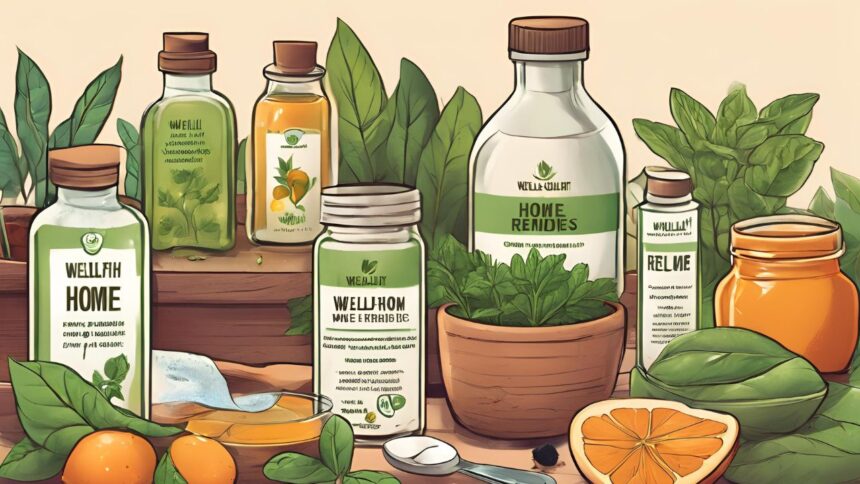Wellhealthorganic Home Remedies Tag – Complete Guide – Trendoinvest
Introduction to Home Remedies
Home remedies have been an integral part of human health care since ancient times. These remedies are often simple, natural, and cost-effective, making them a popular choice for many individuals. In this comprehensive guide, we delve into the Wellhealthorganic Home Remedies Tag, providing you with detailed insights and practical tips for utilizing these remedies to enhance your well-being.
The Benefits of Home Remedies
1. Cost-Effective Solutions
One of the primary advantages of home remedies is their cost-effectiveness. Unlike prescription medications and over-the-counter drugs, which can be expensive, home remedies typically involve ingredients that are readily available in your kitchen or garden. This accessibility makes them an attractive option for many people seeking affordable health care solutions.
2. Natural Ingredients
Home remedies primarily use natural ingredients, which can reduce the risk of adverse side effects commonly associated with synthetic drugs. Natural ingredients like herbs, spices, and essential oils offer therapeutic properties that promote healing and well-being without the added chemicals found in many commercial products.
3. Traditional Wisdom
Home remedies are rooted in traditional knowledge passed down through generations. This wisdom is often based on years of observation and experience, providing a trusted source of information on effective healing practices. By using home remedies, you tap into a rich heritage of natural health care.
Popular Home Remedies and Their Uses
1. Ginger for Digestive Health
Ginger is a powerful herb known for its digestive benefits. It can help alleviate nausea, reduce bloating, and improve overall digestion. To prepare a simple ginger tea, boil a few slices of fresh ginger in water for 10 minutes, strain, and enjoy. Adding honey and lemon can enhance the flavor and benefits.
2. Turmeric for Inflammation
Turmeric contains curcumin, a compound with potent anti-inflammatory and antioxidant properties. It can be used to reduce inflammation and pain associated with conditions like arthritis. Incorporate turmeric into your diet by adding it to soups, stews, or smoothies. A popular remedy is golden milk, made by simmering turmeric, milk, and honey.
3. Honey for Wound Healing
Honey has been used for centuries for its antibacterial and healing properties. It can be applied topically to minor cuts and burns to promote faster healing and prevent infection. Ensure you use raw, unprocessed honey for the best results.
4. Garlic for Immune Support
Garlic is renowned for its immune-boosting properties. It can help fight off colds and infections due to its antibacterial and antiviral effects. Consuming raw garlic cloves or adding them to your meals can enhance your immune function.
5. Aloe Vera for Skin Care
Aloe vera is a versatile plant used for various skin conditions. It can soothe sunburn, moisturize dry skin, and accelerate the healing of minor wounds. Apply fresh aloe vera gel directly to the affected area for best results.
6. Peppermint for Headaches
Peppermint oil is effective in relieving tension headaches. Applying diluted peppermint oil to the temples and forehead can provide quick relief from headache pain. Inhaling peppermint steam can also help alleviate sinus-related headaches.
How to Prepare and Use Home Remedies
1. Herbal Teas
Herbal teas are a popular way to consume the benefits of various herbs. To prepare an herbal tea, steep dried or fresh herbs in hot water for 5-10 minutes. Common herbal teas include chamomile for relaxation, peppermint for digestion, and lavender for stress relief.
2. Topical Applications
For skin-related issues, topical applications of herbs and oils can be highly effective. Create a paste or ointment by mixing the herb with a carrier oil or water, and apply it to the affected area. Examples include turmeric paste for inflammation and aloe vera gel for burns.
3. Inhalation
Inhalation is beneficial for respiratory conditions. Adding a few drops of essential oils like eucalyptus or peppermint to hot water and inhaling the steam can help clear nasal passages and improve breathing.
4. Dietary Incorporation
Many herbs and spices can be incorporated into your daily diet for health benefits. Adding garlic to your meals, sprinkling turmeric on your dishes, and drinking ginger tea are simple ways to boost your health naturally.
Precautions and Considerations
1. Allergies
Always be mindful of potential allergies when using home remedies. Conduct a patch test before applying any new substance to your skin and start with small amounts when consuming new herbs or spices.
2. Interactions with Medications
Some home remedies can interact with prescription medications. Consult with a healthcare professional before starting any new remedy, especially if you are on medication or have underlying health conditions.
3. Quality of Ingredients
The effectiveness of home remedies depends on the quality of the ingredients used. Use fresh, organic herbs and spices whenever possible to ensure the highest potency and purity.
4. Proper Dosage
Stick to recommended dosages and do not overuse any remedy. Natural ingredients can be potent, and excessive use may lead to adverse effects.
Additional Effective Home Remedies
1. Apple Cider Vinegar for Weight Loss
Apple cider vinegar (ACV) is popular for its weight loss benefits. It helps improve metabolism, suppress appetite, and reduce fat accumulation. To use ACV, mix one to two tablespoons with a glass of water and drink it before meals. Adding a bit of honey can enhance the taste.
2. Baking Soda for Heartburn
Baking soda acts as a natural antacid, neutralizing stomach acid and relieving heartburn. Mix a teaspoon of baking soda in a glass of water and drink it slowly. This remedy provides quick relief from acid reflux and indigestion.
3. Lemon and Honey for Sore Throat
A combination of lemon and honey is an effective remedy for sore throats. Lemon provides vitamin C, while honey offers soothing and antibacterial properties. Mix the juice of one lemon with a tablespoon of honey in a cup of warm water and drink it to relieve throat pain.
4. Epsom Salt for Muscle Soreness
Epsom salt, rich in magnesium sulfate, is excellent for relieving muscle soreness and tension. Add a cup of Epsom salt to a warm bath and soak for 20 minutes. The magnesium absorbed through the skin helps relax muscles and reduce inflammation.
5. Cinnamon for Blood Sugar Control
Cinnamon is known for its ability to help regulate blood sugar levels. It improves insulin sensitivity and lowers blood sugar spikes after meals. Sprinkle cinnamon on your oatmeal, yogurt, or smoothies to incorporate this beneficial spice into your diet.
6. Lavender for Insomnia
Lavender is renowned for its calming and sleep-inducing properties. Using lavender essential oil in a diffuser or adding a few drops to your pillow can help you sleep better. Drinking lavender tea before bed is another effective way to promote restful sleep.
Home Remedies for Common Ailments
1. Cold and Flu
For cold and flu symptoms, several home remedies can provide relief:
- Elderberry Syrup: Elderberries are known for their antiviral properties. Elderberry syrup can reduce the duration of colds and flu. Take one to two tablespoons daily during the flu season.
- Steam Inhalation: Adding a few drops of eucalyptus or tea tree oil to hot water and inhaling the steam can help clear nasal congestion.
- Chicken Soup: A classic remedy, chicken soup provides warmth and nutrients that support the immune system and soothe symptoms.
2. Stomach Upset
To ease stomach discomfort:
- Peppermint Tea: Peppermint tea helps relax the digestive tract and reduce symptoms of irritable bowel syndrome (IBS) and indigestion.
- Bananas: Bananas are easy to digest and can help restore electrolytes lost during diarrhea.
- Yogurt: Probiotic-rich yogurt can restore healthy gut bacteria balance, aiding in digestion and relieving bloating.
3. Acne and Skin Blemishes
For clear skin, consider these remedies:
- Tea Tree Oil: Known for its antibacterial properties, tea tree oil can be applied directly to pimples to reduce inflammation and bacteria.
- Honey and Cinnamon Mask: Mix honey and cinnamon to form a paste and apply it to the face. Leave it on for 10-15 minutes before rinsing off. This mask helps fight bacteria and soothe the skin.
- Aloe Vera Gel: Aloe vera helps reduce redness and inflammation associated with acne. Apply fresh aloe vera gel to the affected areas twice daily.
Incorporating Home Remedies into Daily Life
1. Creating a Home Remedy Kit
Having a well-stocked home remedy kit can make it easier to treat minor ailments promptly. Consider including the following items:
- Essential oils (lavender, peppermint, tea tree)
- Herbal teas (chamomile, ginger, peppermint)
- Raw honey
- Apple cider vinegar
- Baking soda
- Epsom salt
- Aloe vera gel
- Fresh or dried herbs (ginger, turmeric, garlic)
2. Regular Use and Monitoring
Incorporate home remedies into your daily routine for preventive health care. Drink herbal teas, use essential oils, and consume beneficial spices regularly. Monitor your body’s responses to these remedies and adjust your use as needed.
3. Combining with Conventional Medicine
Home remedies can complement conventional medicine, but they should not replace professional medical advice and treatment. Always consult with a healthcare provider for serious health issues or if you have concerns about using home remedies.
Exploring Advanced Home Remedies
1. Oil Pulling for Oral Health
Oil pulling is an ancient Ayurvedic practice that involves swishing oil in your mouth to remove bacteria and promote oral hygiene. Use coconut oil or sesame oil for this technique. Swish a tablespoon of oil in your mouth for 15-20 minutes, then spit it out. Oil pulling can help prevent tooth decay, reduce bad breath, and improve gum health.
2. Gua Sha for Pain Relief
Gua Sha is a traditional Chinese therapy that involves scraping the skin with a smooth-edged tool to promote circulation and relieve pain. It’s commonly used to treat muscle pain, tension headaches, and even chronic conditions like fibromyalgia. Apply a lubricant to the skin and use gentle strokes with the Gua Sha tool to stimulate blood flow and alleviate discomfort.
3. Ayurvedic Triphala for Digestive Cleansing
Triphala is a blend of three fruits – Amalaki (Emblica Officinalis), Bibhitaki (Terminalia Bellirica), and Haritaki (Terminalia Chebula) – used in Ayurvedic medicine to support digestion and detoxification. Triphala powder can be taken with warm water before bed to promote regular bowel movements, cleanse the digestive tract, and enhance nutrient absorption.
4. Hydrotherapy for Circulation and Relaxation
Hydrotherapy involves the use of water for therapeutic purposes, such as improving circulation, relieving muscle tension, and promoting relaxation. Alternating between hot and cold water in the shower or soaking in a hot tub with Epsom salt can stimulate blood flow, reduce inflammation, and soothe sore muscles.
5. Cupping Therapy for Pain Management
Cupping therapy is an ancient practice that involves placing cups on the skin to create suction and facilitate healing. It’s commonly used to relieve muscle tension, improve blood flow, and alleviate pain. Cupping can leave temporary marks on the skin, but it’s generally safe and effective for managing various types of pain.
6. Moxibustion for Energy Balance
Moxibustion is a traditional Chinese therapy that involves burning dried mugwort (Artemisia vulgaris) near specific acupuncture points on the body. It’s believed to stimulate energy flow (Qi) and promote healing. Moxa sticks or cones are often used for this purpose, and the warmth generated can help relieve pain, reduce inflammation, and boost overall well-being.
The Evolution of Home Remedies
Over time, home remedies have evolved and adapted to meet the changing needs of individuals seeking natural health solutions. With advancements in scientific research and increased access to information, traditional remedies are now complemented by innovative techniques and holistic approaches to wellness.
Embracing a Holistic Approach to Health
In today’s fast-paced world, where stress, pollution, and unhealthy lifestyle habits abound, embracing a holistic approach to health is more important than ever. Home remedies offer a holistic perspective that addresses not only the symptoms but also the underlying causes of health issues.
By incorporating home remedies into your lifestyle, you empower yourself to take control of your health and well-being. From simple herbal teas to advanced therapeutic techniques, there’s a wealth of natural solutions available to support your journey toward optimal health.
Final Thoughts
The Wellhealthorganic Home Remedies Tag offers a treasure trove of knowledge and insights into the world of natural health care. By exploring the benefits of home remedies and incorporating them into your daily routine, you can unlock a holistic approach to wellness that nourishes your body, mind, and spirit.
Remember to approach home remedies with an open mind and a willingness to experiment. What works for one person may not work for another, so listen to your body and adjust your approach accordingly. With dedication, patience, and a commitment to self-care, you can harness the power of home remedies to enhance your health and vitality.











